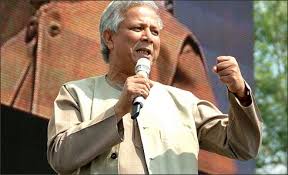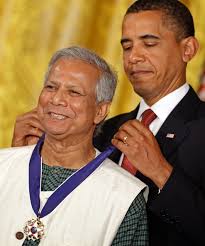
Since being awarded for the first time, in 1901, the Nobel Prize for Peace has combined his name with great personalities, personalities that have shaped the history of the twentieth century and they are writing than the present. From Martin Luther King, Mother Teresa of Calcutta, former German Chancellor Willy Brandt, Nelson Mandela, through the founder of Solidarity, Lech Walesa, to international organizations such as UNICEF, Doctors without Borders, the Red Cross, arriving at ' last name, the Chinese dissident Liu Xiaobo.
Similarly, however, the prestigious prize was awarded, over its history, to embellish the Board of characters not exactly peaceful: just think that was assigned, over a century ago, Ted Roosevelt, one of the most interventionist American Presidents history, and then to Henry Kissinger, who, after the bloody Vietnam for five years and sent to death hundreds of thousands of American soldiers, had signed a peace agreement in Paris in 1973. And, again, the trio Rabin, Peres and Arafat, also protagonists of decades of blood in the Middle East, before deciding to sign a peace, broken shortly afterwards.

Between these two opposing categories, then that is part of the Nobel discussed, such as Al Gore and Obama in recent years, so to speak. Among these there is probably Muhammad Yunus, economist Bengali eighties revolutionized the credit market with the objective of combating poverty in his country and the world.
Yunus founded the Grameen Bank, a bank (now an empire that spans different types of business, among the strongest in the middle of Asia) granting microloans to the most underprivileged segments of the population of Bangladesh (and, later, throughout Asia and below) to enable them to pursue small businesses risollevassero them from poverty. In Bangladesh more than 40% of the population is unable to meet its basic needs for subsistence, and to make matters worse the geographical position of the State requires them to continue environmental disasters.
It was from one of these that was inspired Yunus, an economics professor from the University of Chittagong, to help the people of the villages destroyed by yet another flood to rebuild their lives by running small businesses, funded by the Grameen Bank, which required rates Lower interest of ordinary banks, granting loans for amounts too low and, especially, went against the main principle upon which the credit, the guarantee of repayment: The bank, in fact, offered loans to anyone, even destitute.

History has taught us that Yunus was right to grant small loans to those who do not give guarantees, showing confidence and willingness to bet on who would point no one ever gave life to many stories of liberation from poverty and, above all, have found rates return so high (98%) that no bank can afford even to dream "in Bangladesh, where nothing works - he said Yunus - Microcredit works like a Swiss watch."
To date, over 100 million people worldwide, according to the submissions of his guru, makes use of microcredit to fight poverty, but Grameen has been repeatedly pointed out by intellectuals and humanitarian organizations as a business not too clear contours.
According to many, in fact, that uses the system ends up becoming a sort of noose for the poor, which sometimes (for lack of know-how, especially) can not use the money received in the right way and end up not being able to pay, seeing houses and confiscate all kinds of good, and in some cases ending up in prison, in the absence of property to be seized.
The acquisition of know-how as an instrument of emancipation had been since the beginning, one of the main goals - the social matrix, therefore, not only financial - policy Yunus: the loan would, in fact, contributed to a growing culture, bringing economic self-sufficiency, which would strengthen local communities and families.
It is no coincidence, then, that the primary beneficiaries of this system were women: they were, guarantors of the family, which could revive the farming communities to a level of subsistence. Thirty years around the bottom of this revolution in the world of finance, however, the situation of those who have benefited from microcredit, the villages of Bangladesh and other poor countries that have launched, has not changed much. This was shown by a report of a Norwegian television that, some years ago, you asked the question if it really had been a panacea, microcredit for small economies to these regions, or he had strangled.
"Jobra we met the daughter of the first who obtained microcredit, Sufiya Begun. - Said the journalist Scandinavian - We were later nell'Hillary Village, where the former first lady said U.S. support to Yunus and his bank. And we only saw the poor agent that microcredit has gained nothing, if no other debts. "
It's not all, journalistic reportage also investigating an alleged doubling of the bank accounts of Yunus. These, in fact, has ended up creating a system of alternative credit, more profitable, but that basically works like the traditional one and, as it often creates a spiral of debt from which the poor people of Bangladesh are struggling to get out .

All is not gold that glitters? Maybe not, the fact is that, beyond the ubiquitous and in some regions of strong moral character of his creation, Yunus and microcredit have revived the fortunes of the economy of any country. A few days ago, Prime Minister Sheikh Hasina Bengali had pointed the finger at his famous compatriot and Nobel Prize winner, claiming to want to bring "under surveillance" his bank. He then spoke of "tricks" that the empire Grameen would use to avoid paying taxes.
The prime minister then appointed a special commission of inquiry to investigate bank accounts, but it will take three months before it gives a response. "When the time comes - has, meanwhile, told Reuters the party concerned - every transition requires a friendly atmosphere and support both inside and outside boards of directors of the bank, to ensure we can continue to stay true to our mission to the poor. "
Beyond the offenses, all of which are to be verified, but the doubt about the real emancipatory function of the system of microcredit remains. I agree that it works, given the data on loan repayment, but it certainly fits into that system created by banks, which is based on the entire planet. Sure, it does it softer and probably more moral, but the concept does not differ much from that which sustains the world for centuries, for which banks create debt and citizens spend their lives fighting to extinguish it.

